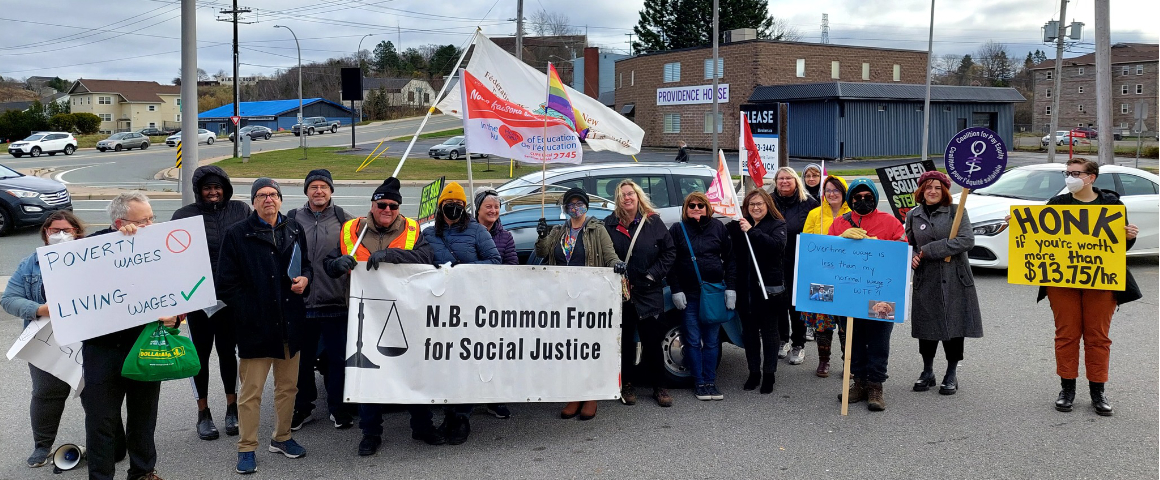PV staff
This summer, Maytree published the 2022 edition of its Welfare in Canada report which provides information about households receiving social assistance last year, broken down by province and territory. In 2021, 2.8 million people in Canada (over 7 percent of the population) lived in poverty, with an estimated 1.7 million receiving social assistance. No jurisdiction in Canada provides assistance benefits which meet the official line, and most are below the deep poverty line.
The 2022 edition shows that New Brunswick had the lowest social assistance rates across all categories (individuals considered employable, people with a disability and households with children), in all provinces or territories.
In response to the report, the New Brunswick Common Front for Social Justice is calling for assistance rates in the province to be boosted above the poverty line.
According to Maytree, unattached single people considered employable in New Brunswick received an average of just $8,031 in 2022. This income was 34 percent behind the average of all provincial rates and 31 percent behind the average of all Atlantic provincial rates. Unattached single people with a disability received just slightly more – $10,884 – which was 30 percent behind the cross-country average and 31 percent behind the Atlantic average. Households with children were also behind the average of all provincial and Atlantic provincial rates.
New Brunswick was the lowest in Canada in two out of four social assistance categories. An unattached single adult in Moncton received only 33 percent of the official poverty line (measured according to Market Basket Measure) and 44 percent of the Deep Income Poverty (DIP) threshold, while a couple with two children in Moncton received only 59 percent of the official poverty line and 78 percent of the DIP threshold.
The Common Front’s Community Co-chair Robert MacKay said the figures show this is a life-or-death situation.
“We are demanding the rates be raised above the poverty line. The Maytree report shows that New Brunswickers living in poverty are facing an emergency. As a person living on social assistance, I live the effects of poverty on a daily basis. Social assistance recipients are suffering and can’t afford basic necessities.
“Who can live decently on a little over $8,000 or $10,000? How many people will face dire consequences or die before our government acts?
“This report is an urgent call for compassionate New Brunswickers to mobilize to prevent people from losing their life due to inadequate income.”
Janelle LeBlanc, the Common Front’s Provincial Coordinator, echoed MacKay’s comments and called on the government to act.
“As the Maytree report shows, social assistance recipients are living well-below the poverty line and in deep poverty. It’s inhumane. Social assistance income has declined these past few years for unattached single households deemed employable or with a disability, and households with children.
“New Brunswick is in a housing affordability and supply crisis. Homelessness rates are increasing. Our food insecurity rates were the second highest in all provinces in 2022. Poverty is costing the province over $1 billion a year.
“The Government of New Brunswick must act swiftly and invest in the social assistance program. If not, more people will continue to suffer, and social problems will continue to grow.”
The Common Front is calling on the government to take specific actions including:
- Raising social assistance rates above the poverty line in addition to annual indexation.
- Abolishing the Household Income Policy, which is used to deny individual benefits by basing eligibility on combined household income.
- Updating the application and eligibility process of the Extended Benefits Program, including an updated social definition of disability.
- Improving access and ability to secure tools to make remaining at home simpler and easier, and providing easy access to appropriate hours of homecare.
- Making all government websites accessible for persons with disabilities, including social assistance.
The New Brunswick Common Front for Social Justice was formed in 1997, following workers’ mobilizations in 1992, 1994 and 1996 against cutbacks to Unemployment Insurance (now Employment Insurance). On each of those occasions, new action committees were created throughout New Brunswick to oppose the cuts, and militants recognized the need to have a permanent organization in place. After the 1996-1997 campaign, the Canadian Labour Congress and the New Brunswick Federation of Labour brought together dozens of union and community activists to form the Common Front in Fredericton on March 11, 1997.
Get People’s Voice delivered to your door or inbox!
If you found this article useful, please consider subscribing to People’s Voice.
We are 100% reader-supported, with no corporate or government funding.




